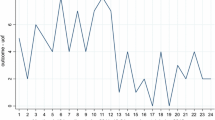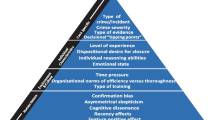Abstract
According to law enforcement, many witnesses are intoxicated either at the time of the crime, the interview, or both (Evans et al., Public Policy Law 15(3):194–221, 2009). However, no study to date has examined whether intoxicated witnesses’ recall is different from sober witnesses’ and whether they are more vulnerable to misinformation using an ecologically valid experimental design. Intoxicated, placebo, and sober witnesses observed a live, staged theft, overheard subsequent misinformation about the theft, and took part in an investigative interview. Participants generally believed they witnessed a real crime and experienced a real interview. Intoxicated witnesses were not different from placebo or sober witnesses in the number of accurate details, inaccurate details, or “don’t know” answers reported. All the participants demonstrated a misinformation effect, but there were no differences between intoxication levels: Intoxicated participants were not more susceptible to misinformation than sober or placebo participants. Results are discussed in the light of their theoretical and applied relevance.
Similar content being viewed by others
Notes
Based on Yuille and Tollestrup’s (1990) data, this study was designed to detect an actual effect size of at least a 5%. With our sample size (n = 93), this study had 89% power to detect a medium effects size (η 2p = .06) to find an interaction between intoxication group and misinformation in our 3 × 2 repeated measures ANOVA. Furthermore, we had a 94% power to detect a medium/large effect (η 2p = .11) of intoxication on any of the recall measures in a one-way ANOVA.
Owing to several experimental constraints to the misinformation manipulation within this study’s “real-world” procedure, misinformation and control items were not counterbalanced across participants.
For proportional data, we also tested each comparison using different data transformations. Neither had an impact on our findings, i.e., all comparisons remained non-significant.
References
Abroms, B. D., Gottlob, L. R., & Fillmore, M. T. (2006). Alcohol effects on inhibitory control of attention: Distinguishing between intentional and automatic mechanisms. Psychopharmacology, 188, 324–334. doi:10.1007/s00213-006-0524-y.
Assefi, S. L., & Garry, M. (2003). Absolute memory distortions: Alcohol placebos influence the misinformation effect. Psychological Science, 14, 77–80. doi:10.1111/1467-9280.01422.
Benton, T. R., Ross, D. F., Bradshaw, E., Thomas, W. N., & Bradshaw, G. S. (2006). Eyewitness memory is still not common sense: Comparing jurors, judges and law enforcement to eyewitness experts. Applied Cognitive Psychology, 20(1), 115–129. doi:10.1002/acp.1171.
Bisby, J. A., Leitz, J. R., Morgan, C. J. A., & Curran, H. V. (2010). Decreases in recollective experience following acute alcohol: A dose–response study. Psychopharmacology, 208, 67–74. doi:10.1007/s00213-009-1709-y.
Breitmeier, D., Seeland-Schulze, I., Hecker, H., & Schneider, U. (2007). The influence of blood alcohol concentrations of around.03% on neuropsychological functions—a double-blind, placebo-controlled investigation. Addiction Biology, 12, 183–189. doi:10.1111/j.1369-1600.2007.00056.x.
Brown, J., Brignell, C. M., Dhiman, S. K., Curran, H. V., & Kamboj, S. K. (2010). Acute effects of alcohol on memory: Impact of emotional context and serial position. Neurobiology of Learning and Memory, 93, 428–434. doi:10.1016/j.nlm.2009.12.010.
Bruce, K. R., & Pihl, R. O. (1997). Forget “drinking to forget”: Enhanced consolidation of emotionally charged memory by alcohol. Experimental and Clinical Psychopharmacology, 5, 242–250. doi:10.1037/1064-1297.5.3.242.
Clifasefi, S. L., Takarangi, M. K., & Bergman, J. S. (2006). Blind drunk: The effects of alcohol on inattentional blindness [Special Issue: Bethschrift Redux: Research inspired by the work of Elizabeth F. Loftus]. Applied Cognitive Psychology, 20, 697–704. doi:10.1002/acp.1222.
Cunningham, S. J., Milne, A. B., & Crawford, J. R. (2007). The effects of acute alcohol intoxication on person memory: The stereotypical drunk. Journal of Applied Social Psychology, 37, 187–199. doi:10.1111/j.0021-9029.2007.00155.x.
Curran, H. V., & Hildebrandt, M. (1999). Dissociative effects of alcohol on recollective experience. Consciousness and Cognition, 8, 497–509. doi:10.1006/ccog.1999.0417.
Department of Transportation. (2006). Countermeasures that work: A highway safety countermeasure guide for state highway safety offices (DOT Publication No. 809980). Washington, DC: Author.
Evans, J. R., & Schreiber Compo, N. (2010). Mock jurors’ perceptions of identifications made by intoxicated witnesses. Psychology, Crime and Law, 16(3), 191–210. doi:10.1037/a0016837.
Evans, J. R., Schreiber Compo, N., & Russano, M. (2009). Intoxicated witnesses and suspects: Procedures and prevalence according to law enforcement. Psychology, Public Policy and the Law, 15(3), 194–221. doi:10.1037/a0016837.
Fillmore, M. T., & Blackburn, J. (2002). Compensating for alcohol-induced impairment: Alcohol expectancies and behavioral disinhibition. Journal of Studies on Alcohol, 63, 237–246. Retrieved from www.csa.com.
Fisher, R. P. (1995). Interviewing victims and witnesses of crime. Psychology, Public Policy, and Law, 1, 732–764. doi:10.1037/1076-8971.1.4.732.
Fisher, R. P., & Schreiber, N. (2007). Interviewing protocols to improve eyewitness memory. In M. Toglia, R. Lindsay, D. Ross, & J. Reed (Eds.), The handbook of eyewitness psychology: Vol. 1. Memory for events (pp. 53–80). Mahwah, NJ: Erlbaum Associates. Retrieved from www.csa.com.
Fisher, H. R., Simpson, R. I., & Kapur, B. M. (1987). Calculation of blood alcohol concentration (BAC) by sex, weight, number of drinks and time. Canadian Journal of Public Health, 78, 300–304.
Garfinkel, S. N., Dienes, Z., & Duka, T. (2006). The effects of alcohol and repetition at encoding on implicit and explicit false memories. Psychopharmacology, 188, 498–508. doi:10.1007/s00213-006-0480-6.
Giancola, P. R., & Corman, M. D. (2007). Alcohol and aggression: A test of the attention-allocation model. Psychological Science, 18(7), 649–655. doi:10.1111/j.1467-9280.2007.01953.x.
Gudjonsson, G. H. (1984). A new scale of interrogative suggestibility. Personality and Individual Differences, 5(3), 303–314. doi:10.1016/0191-8869(84)90069-2.
Hartley, J. T., & Birnbaum, I. M. (1978). Alcohol and storage deficits: Kind of processing? Journal of Verbal Learning & Verbal Behavior, 17(5), 635–647. doi:10.1016/S0022-5371(78)90392-4.
Kassin, S. M., Tubb, V. A., Hosch, H. M., & Memon, A. (2001). On the ‘‘general acceptance’’ of eyewitness testimony research. American Psychologist, 56, 405–416. doi:10.1037/0003-066X.56.5.405.
Kirchner, T. R., & Sayette, M. A. (2003). Effects of alcohol on controlled and automatic processes. Experimental and Clinical Psychopharmacology, 11, 167–175. doi:10.1037/1064-1297.11.2.167.
Knowles, S. K. Z., & Duka, T. (2004). Does alcohol affect memory for emotional and nonemotional experiences in different ways? Behavioural Pharmacology, 15, 111–121. doi:10.1097/00008877-200403000-00003.
Lister, R. G., Gorenstein, C., Risher-Flowers, D., Weingartner, H. J., & Eckhardt, M. J. (1991). Dissociation of the acute effects of alcohol on implicit and explicit memory processes. Neuropsychologia, 29, 1205–1212. doi:10.1016/0028-3932(91)90034-6.
Loftus, E. F., Miller, D. G., & Burns, H. J. (1978). Semantic integration of verbal information into a visual memory. Journal of Experimental Psychology: Human Learning & Memory, 4, 19–31. doi:10.1037/0278-7393.4.1.19.
MacDonald, A. B., Baker, J. M., Stewart, S. H., & Skinner, M. (2000). Effects of alcohol on the response of hyperventilation of participants high and low in anxiety sensitivity. Alcoholism, Clinical and Experimental Research, 24, 1656–1665. doi:10.1111/j.1530-0277.2000.tb01967.x.
MacDonald, T. K., Fong, G. T., Zanna, M. P., & Martineau, A. M. (2000). Alcohol myopia and condom use: Can alcohol intoxication be associated with more prudent behavior? Journal of Personality and Social Psychology, 78, 605–619. doi:10.1037/0022-3514.78.4.605.
Marinkovic, K., Halgren, E., & Maltzman, I. (2004). Effects of alcohol on verbal processing: An event-related potential study. Alcoholism, Clinical and Experimental Research, 28, 415–423. doi:10.1097/01.ALC.0000117828.88597.80.
Maylor, E. A., & Rabbitt, P. M. (1993). Alcohol, reaction time and memory: A metaanalysis. British Journal of Psychology, 84, 301–317. Retrieved from www.csa.com.
Maylor, E. A., Rabbitt, P. M., & Kingstone, A. (1987). Effects of alcohol on word categorization and recognition memory. British Journal of Psychology, 78, 233–239. Retrieved from www.csa.com.
McKay, D., & Schare, M. L. (1999). The effects of alcohol and alcohol expectancies on subjective reports and physiological reactivity: A meta-analysis. Addictive Behaviors, 24, 633–647. doi:10.1016/S0306-4603(99)00021-0.
Mintzer, M. Z. (2007). The acute effects of alcohol on memory: A review of laboratory studies in healthy adults. International Journal of Disability and Human Development, 6(4), 397–403. Retrieved from www.csa.com.
Monahan, J. L., & Lanutti, P. J. (2000). Alcohol as social lubricant. Alcohol myopia theory, social self-esteem, and social interaction. Human Communication Research, 26, 175–202. doi:10.1093/hcr/26.2.175.
Moulton, P. L., Petros, T. V., Apostal, K. J., Park, R. V., Ronning, E. A., King, B. M., & Penland, J. G. (2005). Alcohol-induced impairment and enhancement of memory: A test of the interference theory. Physiology & Behavior, 85, 240–245. doi:10.1016/j.physbeh.2005.03.011.
Nelson, T. O., McSpadden, M., Fromme, K., & Marlatt, G. A. (1986). Effects of alcohol intoxication on metamemory and on retrieval from long-term memory. Journal of Experimental Psychology: General, 115, 247–254. doi:10.1037/0096-3445.115.3.247.
Pokomy, A. D., Miller, B. A., & Kaplan, H. B. (1972). The brief MAST: A shortened version of the Michigan Alcoholism Screening Test. American Journal of Psychiatry, 129, 342–345. Retrieved from www.csa.com.
Ray, S., & Bates, M. E. (2006). Acute alcohol effects on repetition priming and word recognition memory with equivalent memory cues. Brain and Cognition, 60, 118–127. doi:10.1016/j.bandc.2005.07.009.
Ray, S., Bates, M. E., & Ely, B. M. (2004). Alcohol’s dissociation of implicit and explicit memory processes: Implications of a parallel distributed processing model of semantic priming. Experimental and Clinical Psychopharmacology, 12, 118–125. doi:10.1037/1064-1297.12.2.118.
Read, J. D., Yuille, J. C., & Tollestrup, P. (1992). Recollections of a robbery. Effects of arousal and alcohol upon recall and person identification. Law and Human Behavior, 16(4), 425–446. doi:10.1007/BF02352268.
Roediger, H. L., I. I. I., & McDermott, K. B. (1995). Creating false memories: Remembering words not presented in lists. Journal of Experimental Psychology: Learning, Memory, & Cognition, 21, 803–814. doi:10.1037/0278-7393.21.4.803.
Santtila, P., Ekholm, M., & Niemi, P. (1999). The effects of alcohol on interrogative suggestibility: The role of state-anxiety and mood states as mediating factors. Legal and Criminological Psychology, 4, 1–13. doi:10.1348/135532599167707.
Söderlund, H., Parker, E. S., Schwartz, B. L., & Tulving, E. (2005). Memory encoding and retrieval on the ascending and descending limbs of the blood alcohol concentration curve. Psychopharmacology, 182, 305–317. doi:10.1007/s00213-005-0096-2.
Soraci, S. A., Carlin, M. T., Read, J. D., Wakeford, Y., Pogoda, T., Cavanaugh, S., & Shin, L. (2007). Psychological impairment, eyewitness testimony, and false memories: Individual differences. In M. P. Toglia, J. D. Read, D. F. Ross, & R. C. L. Lindsay (Eds.), Handbook of eyewitness psychology: Vol. II: Memory for events (pp. 261–297). Mahwah, NJ: Erlbaum Associates. Retrieved from www.csa.com.
Steele, C. M., & Josephs, R. A. (1990). Alcohol myopia: Its prized and dangerous effects. American Psychologist, 45, 921–933. doi:10.1037/0003-066X.45.8.921.
Testa, M., Fillmore, M. T., Norris, J., Abbey, A., Curtin, J. J., Leonard, K. E., … Hayman, L. W., Jr. (2006). Understanding alcohol expectancy effects: Revisiting the placebo condition. Alcoholism: Clinical and Experimental Research, 30, 339–348. doi:10.1037/0003-066X.45.8.921.
White, A. M. (2003). What happened? Alcohol, memory blackouts, and the brain. Alcohol Research & Health, 27, 186–196. Retrieved from www.csa.com.
Yuille, J. C., & Tollestrup, P. A. (1990). Some effects of alcohol on eyewitness memory. Journal of Applied Psychology, 75, 268–273. doi:10.1037/0021-9010.75.3.268.
Author information
Authors and Affiliations
Corresponding author
About this article
Cite this article
Schreiber Compo, N., Evans, J.R., Carol, R.N. et al. Intoxicated Eyewitnesses: Better than Their Reputation?. Law Hum Behav (2011). https://doi.org/10.1007/s10979-011-9273-5
Published:
DOI: https://doi.org/10.1007/s10979-011-9273-5




